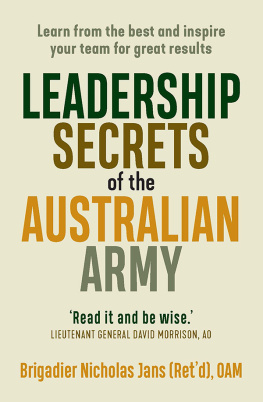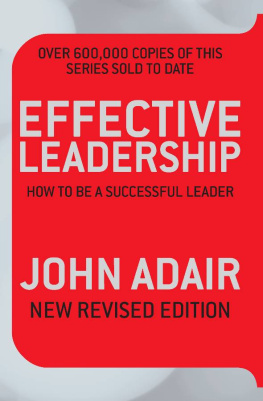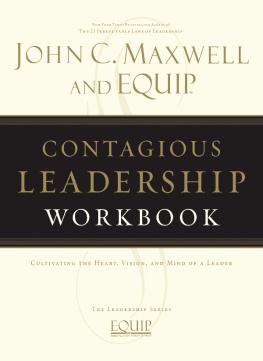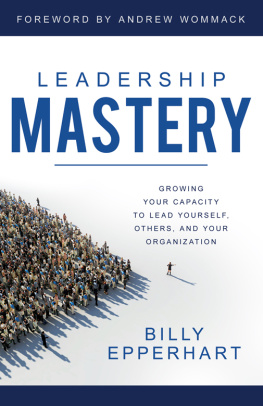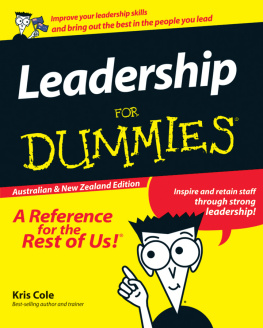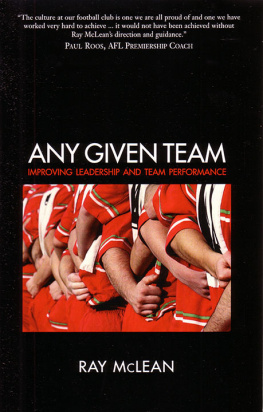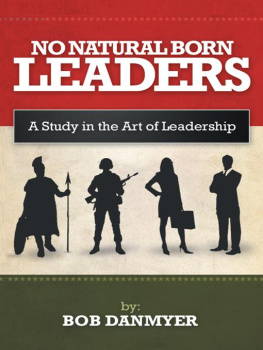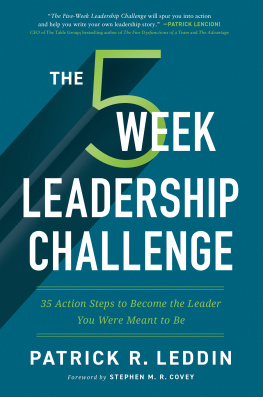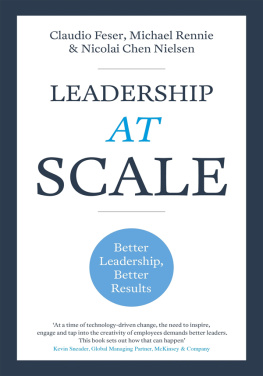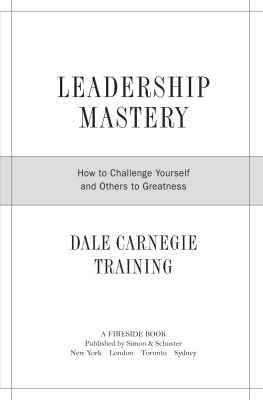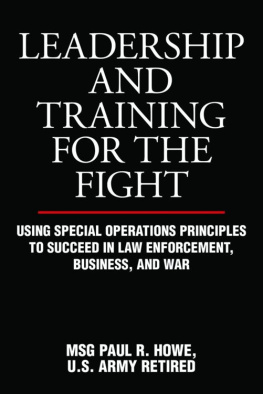Read it and be wise.
From the Foreword by Lieutenant General David Morrison AO, Australian of the Year 2016
Australias tradition of military leadership has a lot to offer leaders in business, from sensible structures and disciplines to the clear obligation to care for ones people. Nick Jans conveys that leadership tradition with great clarity.
Paul Franklin, General Manager Payments, National Australia Bank
This book provides great insights into leadership that can be applied to everyday corporations and not just within the military, so that we as readers can make better leaders within our differing environments.
Linda Rudd MRICS, Senior Director, Asset Management Services, Knight Frank Australia Pty Ltd
War is difficult, highly complex and unpredictable, and success on the battlefield requires strong consistent leadership and systems across various functions. Nicholas Jans draws out those skills, knowledge and attributes for business leaders to apply within their organisation and marketplace.
David John Sloan BCom, EMBA, GAICD, General Manager/Owner, Bulla Dairy Foods (Ex-Reserve soldier, 4/19 PWLH, Australian Army)
The mention of military leadership can invoke images of blinding heroics, risking a flawed start to any study into leadership. Nick Jans simply asks that we start with the militarys values, inviting us to follow evidence of why the military leads as it does, allowing us to determine what lessons can be drawn out.
John Keith, Chairman, Atomo Diagnostics

Royalties from sales of Leadership Secrets of the Australian Army are going to Soldier On, the support services provider for national service personnel and their families.
First published in 2018
Copyright Nicholas Jans 2018
All rights reserved. No part of this book may be reproduced or transmitted in any form or by any means, electronic or mechanical, including photocopying, recording or by any information storage and retrieval system, without prior permission in writing from the publisher. The Australian Copyright Act 1968 (the Act) allows a maximum of one chapter or 10 per cent of this book, whichever is the greater, to be photocopied by any educational institution for its educational purposes provided that the educational institution (or body that administers it) has given a remuneration notice to the Copyright Agency (Australia) under the Act.
Allen & Unwin
83 Alexander Street
Crows Nest NSW 2065
Australia
Phone: (61 2) 8425 0100
Email:
Web: www.allenandunwin.com

ISBN 978 1 76063 180 2
eISBN 978 1 76063 624 1
Internal design by Midland Typesetters, Australia
Set by Midland Typesetters, Australia
Cover design: Luke Causby/Blue Cork
To Colonel Michael Crawford, MBE, who died on 22 July 2015, respected and remembered by many, not least of whom are his former subordinates Nick Jans and Noel Turnbull.
A culture of adaptability is vital to survival in the armed services. As business executives cope with increasing unpredictability, they can take a page from the militarys book.
Harvard Business Review, November 2010
Contents
A long time ago, when I was a junior officer in the great national institution that is our Army, I was struggling to find my place, not just in my newfound profession but also in life more generally. It was 1982 and I was an instructor at the School of Infantry, at Singleton in the Hunter Valley in New South Wales.
I had joined the Army without anything approaching a vocation. To be honest, I had finished an indifferent Arts degree at the Australian National University, I was broke and I didnt want to stay in Canberra. I thought I would do several years and then move on to something different, and it was working out that way until one particular event that gave me much needed ballast in my life.
I had let the team down. My memories are hazy as to the actual circumstances but I knew that I had performed to a less than ideal benchmark. I cared, but at one level I didnt. I was ready to leave. I was a lieutenant, and the sergeant working for me was clearly disappointed in my commitment. He was so much my senior in terms of life and military experience and he said, without any obvious signs of deference, I want a word with you. I was ushered into the office we shared and he closed the door. He looked directly at me and said, You need to realise that you are the legacy of all who have served before youthousands of men and women who put service before self. You are the legacy of your parents, your teachers and your friends. What you are not asking yourself is about the legacy you are going to leave.
Its all about legacy. That is the gift we all get to give. It can be big, sometimes touching nations and huge corporate entities if that is the station in life we attain, or it can be small but vital, touching families and friends if we live a life more private. But big or small, legacy is delivered through leadership and belief.
And that is the focus of this bookleadership that continues to resonate and have relevance, even after we have left the roles in which we were required to lead.
Nick Jans has practical experience to draw on, but it is the insights of those who have shared their stories that really speak to what authentic leadership is all about. No one is born a natural leader. We all need to think deeply about the attributes required to exercise effective leadership, to find role models from whom we take inspiration, and to learn the deeply human skills that will enable us to leave that legacy. Leadership Secrets of the Australian Army has all this in spades. Read it and be wise.
Lieutenant General David Morrison, AO
Former Chief of Army and 2016 Australian of the Year
The seeds from which this book grew were planted in the first week of February 2009. On the Thursday I ran a seminar on Army leadership as part of a new Executive MBA at Sydney University. Buoyed by its reception, I travelled home on the Saturday morning, 7 February, to the little town of Marysville in Victorias Central Highlands with ideas for a book running through my mind.
I arrived just in time to help my wife defend our house against the worst bushfire ever recorded in Australia. Across Victoria on that Black Saturday, 173 people died and more than 2000 houses were destroyed. All plans were thrust into the background as Judy and I joined a small community leadership group working on local recovery.
My experiences in community leadership during the following year confirmed many of the principles I had highlighted in my Sydney University seminar. And as I drew instinctively on habits embedded by 25 years in uniform, supplemented by my study of leadership in the previous decade, I saw their applicability over and over again.
I developed a simple model that shows how the various core activities of leadership fit together, the model that became the 3Rs of leadership described in this book.
It was my guide for day-to-day and often moment-to-moment action, and for reflecting on and learning from my performance. For the first time in my experience as a leader I was able to see clearly what I should be doing, and to see why certain things were working and others werent. Similarly, I used the model to analyse the behaviour of the many outstanding leaders who visited us and thus get a better idea of just what underpinned their magic.

